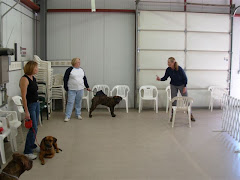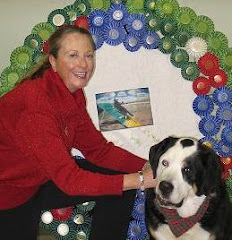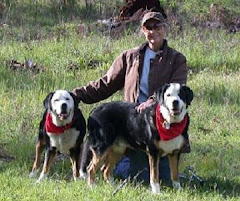
Photo: This dog's been taught to handle random events with a cool (?) head.
While routine is important to the well-being of all dogs, it's equally important to teach them to handle "random events." A truly balanced dog is one who can handle changes in routine as if the changes themselves are routine.
Lizzie's the best dog I've ever had, partly because she had a genetic predisposition to being an ideal companion dog, but also because I exposed her to everything from the day I got her when she was 5 months old. She went to classes and work, accompanied me to every social event, walked scores of miles at my side, met hundreds of dogs, and put up with our varied work and play schedules. If my life (or hers) got turned upside down tomorrow, I'm confident she could handle it because she's become "flexible."
Some of you may be lucky enough to have a similarly portable companion dog who goes everywhere with you, takes everything in stride, and is basically unflappable whether you're at a family reunion, shooting range, dog show, department store, or RV park. While many of these dogs are born easy-going (i.e., it's their "nature"), others are a product of the "nurture" side of behavior development. They were carefully and thoughtfully exposed to literally everything imaginable while they were young.
Older dogs can learn to handle random events too. (Yes, you can teach an old dog new tricks.) Whether we're talking puppies or geriatric dogs, there's one very big prerequisite to your dog's ability to handle "the world." He needs a leader to show the way.
Let's say you have a nine-week-old puppy and you're concerned that the vacuum cleaner will traumatize him. Should you put him in another room where he can't hear or see it? Should you talk to him about the vac and show it to him and tell him not to be scared when you first turn it on? Or should you just put him in his crate some distance away from the vac, and leave him there so he can see you while you go about your NORMAL business? I opt for the latter. Hiding and overprotecting our dogs from everything will not teach them to handle "random events." Trying to coddle them through scary situations won't work either; in fact, it will only make them more nervous. Being a strong, confident leader, however, who takes the vacuum cleaner in stride--and who is actually in control of this perceived monster--will demonstrate to the dog that you are to be trusted. If Leader isn't projecting fear of a situation, the dog knows he doesn't have to fear it either.
Leadership will always be the most important element you can bring to your relationship with your dog. When you project leadership--confidence, control, level-headedness, consistency, and trustworthiness--in all your interactions with your dog, the "random events" of life will simply become routinely interesting days for him!


















No comments:
Post a Comment